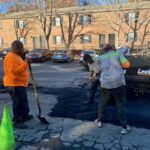Constructing or resurfacing an asphalt cul-de-sac presents a few unique challenges. However, an experienced paving contractor with a well-trained crew, the proper equipment, and great planning skills can meet those challenges.
Why Is a Cul-de-Sac a Challenge for a Paving Contractor?
Most roadway and parking lot paving companies spend the bulk of their time working on pavements that feature straight lines. A cul-de-sac is a circular pavement, and the only straight line is usually just where the entry and the circle connect. Paving contractors must analyze the cul-de-sac thoroughly to determine how to place and compact the asphalt. Most of the equipment that an Atlanta paving contractor owns is designed to operate in a straight line. The contractor must make numerous changes to the normal techniques of installing asphalt overlays or new paving.
How Important Are the Crew Members to the Success of a Paving Contractor?
Almost all reputable paving contractors will freely admit that experienced, skilled employees are critical for the company’s success. Although the contractor is responsible for the success or failure of a project, crew members are the ones who must execute the plan. If a paving company does not hire and retain well-trained employees, customers will not get exceptional results.
Why Is the Right Equipment Essential for Paving a Cul-de-Sac?
When paving contractors are installing a rectangular or square pavement, the equipment can move in straight lines. One problem with cul-de-sacs is that it is usually impossible to get the paver hopper and the asphalt truck to interface. This makes it very challenging to transfer the hot asphalt to the paver hopper. It is not a good idea to move the paver back to the truck to refill it. A material transfer vehicle, skid steer loader, bucket machine, or other loader can simplify matters. The paver can stay in place, and this can reduce the chances of cold joints or bumps in the pavement.
What Goes Into the Planning for Installing an Asphalt Overlay or New Pavement on a Cul-de-Sac?
There are numerous details that an Atlanta paving contractor must consider for cul-de-sac asphalt overlays or new pavements. Here are a few of them.
1. Drainage: The contractor must determine how the water will drain off the pavement. In a circular configuration, the water may flow from the center evenly toward the entire perimeter. However, it could also flow in only two directions. If the contractor does not get the drainage right, water could end up pooling in the center of the circle.
2. First Pass: Some contractors make the initial pass all around the circle right next to the curb. However, this means that the asphalt will be cool before they make the next pass, creating a cold joint. Cold joints create issues with compaction that can result in water intrusion, cracking, and other failures. The best approach is to divide the cul-de-sac in half, then pave each half from the outside to the center. This helps prevent cold joints.
3. Subsequent Passes: After the initial pass, the contractor can make straight passes that narrow as they go. In other words, think of the cul-de-sac as a pie that the contractor divides into pieces. In fact, some contractors refer to paving a circle as filling the pie. This technique reduces the number of passes as well as handwork.
4. Compaction: Proper compaction is essential if the resulting pavement is to be smooth and long-lived. Compaction must take place promptly, but workers must leave a strip of uncompacted material along the edge for the next pass. That way, the roller operator can tie both passes together and create a hot joint at the same time. This reduces raking, luting, and other handwork.
The Surface Masters professionals can expertly pave or overlay cul-de-sacs, parking lots, or streets. We are a highly respected company with our headquarters in Marietta. We also offer parking lot striping, sealcoating, asphalt patching, pavement markings, asphalt milling, asphalt overlay, and concrete repair and installation. Our craftsmanship is exceptional, our reputation is impeccable, and our customer service is exemplary. You can request a free quote by emailing Info@TheSurfaceMasters.com, calling 770-250-6392, or filling out the online form.


